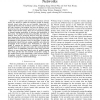34 search results - page 1 / 7 » Maximize Secondary User Throughput via Optimal Sensing in Mu... |
GLOBECOM
2010
IEEE
13 years 2 months ago
2010
IEEE
In a cognitive radio network, the full-spectrum is usually divided into multiple channels. However, due to the hardware and energy constraints, a cognitive user (also called second...
INFOCOM
2012
IEEE
11 years 7 months ago
2012
IEEE
—Cognitive Radio Networks allow unlicensed users to opportunistically access the licensed spectrum without causing disruptive interference to the primary users (PUs). One of the ...
VTC
2010
IEEE
13 years 3 months ago
2010
IEEE
—In this paper, we develop an opportunistic spectrum scheduling scheme for cognitive radio networks. In the proposed scheme, the channel status (i.e., whether being occupied by p...
ICC
2007
IEEE
13 years 11 months ago
2007
IEEE
— In cognitive radio networks, the secondary network (users) are allowed to utilize the frequency bands of primary network (users) when they are not currently being used. To supp...
GLOBECOM
2007
IEEE
13 years 6 months ago
2007
IEEE
—Open spectrum systems allow unlicensed secondary users equipped with cognitive radio to opportunistically access the spectrum underutilized by primary users. Cognitive radio has...

